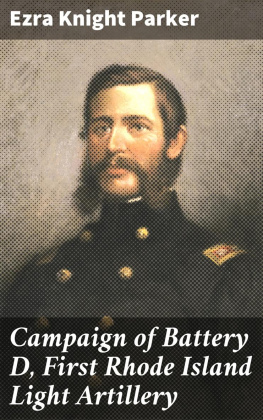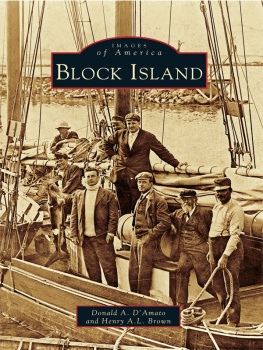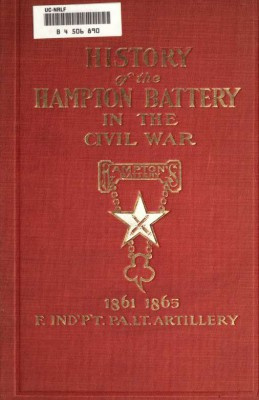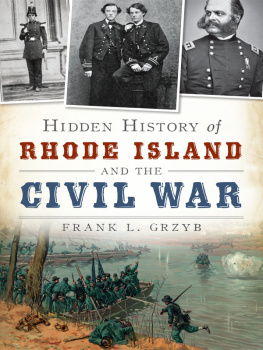"
In March, 1863, Gen. A. E. Burnside, having been relieved at his own request of the command of the Army of the Potomac, was soon afterwards assigned to the Department of the Ohio. Upon his special request, the Ninth Army Corps was also detailed for service in this department, and at once preparations were made for the transportation of the corps from Virginia to Kentucky. Battery D, First Rhode Island Light Artillery, Capt. William W. Buckley, was at that time attached to the Ninth Corps and was sent with its corps to the west. This battery had been at the beginning of its service attached to the first division of the Army of the Potomac, and when the army was divided into army corps, this battery was included in the first corps commanded by General McDowell. Its first active service was in the short and successful campaign to Fredericksburg, in April and May, 1862. Then it went through the campaign of the Army of Virginia, under Gen. John Pope, losing heavily at the battle of the second Manassas, then again under General McClellan, in his successful campaign of South Mountain and Antietam. Meantime, General McDowell had been succeeded by General Hooker in the command of the First Army Corps. It was in the Fredericksburg campaign under Burnside, and was by his order transferred from the First to the Ninth Army Corps. After a not unpleasant march, both by rail and steamboat, the battery reached Lexington, Ky., on March 30th, 1863, and went into camp on the Fair grounds. Here it remained but a week, and then the line of march was taken up for camp Dick Robinson. On the 26th, the battery began its march from camp Dick Robinson to Somerset, near the Cumberland river, completing it on the 7th of May, 1863, and there it remained until the 7th of June. It was now expected that within a few days the march for East Tennessee would commence. Although we, members of the battery, well knew that the campaign would be arduous and full of dangers, still we were all anxious to advance. In consequence of orders to General Burnside to send a part of his command to Vicksburg to assist General Grant, and in consequence of the raid of Gen. John Morgan, it was not until the 21st of August, 1863, that the expedition started. The Twenty-third Army Corps was the only corps that commenced at that date the march over the Cumberland river and mountains. General Hartzuff commanded the corps, consisting of three divisions commanded by Generals White, Hascall and Carter, respectively. We were attached to Gen. Hascall's division, and marched with our division by way of Stanford, Crab Orchard and Cub Creek to the Cumberland river. The Ninth Corps was reported to be at Cincinnati and to follow close upon the tracks of the Twenty-third Corps. The strength of the Twenty-third Corps was, perhaps, 15,000 or 20,000 men of all arms.
The march over the Cumberland mountains was full of adventures and labors. It would require a much longer paper than this to describe the many incidents that befell us on that famous march. We had no snow nor ice to encounter, but otherwise I doubt whether or not Napoleon's crossing of the Alps was more fraught with dangers and hardships than was this crossing of the Cumberland mountains by the Army of the Ohio. On the 4th of September, 1863, we arrived upon the bluffs of the Tennessee river, opposite Loudon. Here we remained, recuperating, until the 15th of September. The enemy had hurriedly retreated upon our arrival at Loudon, leaving horses, mules and beef cattle, which we duly appropriated to our own use. A large amount of wheat and corn was found in the possession of the farmers, which was seized by the quartermasters. A steam flour-mill was found in good condition and was employed in grinding up the wheat and corn. We supplemented our rations with chicken and fresh pork while we were encamped at Loudon. We were on the main line of railway from Virginia to the Southwestern states. In their retreat from Loudon, the enemy had burned the bridge across the Tennessee at that point. It was several days before we were able to place across the river a pontoon bridge. From the south, in the direction of Chattanooga, Gen. N. B. Forrest often threatened us. From the north, a General Jones was daily reported to be advancing down the valley of the Holston upon Knoxville. About the time that our battery arrived at Loudon, Gen. Burnside made a public entry into Knoxville. General Burnside was not a little disappointed in not having with him the Ninth Army Corps as early as he expected. The corps had been transported from Vicksburg (after having done excellent service before that city and also at Jackson) to Cincinnati, Ohio. In consequence of the great heat at Vicksburg and of the arduous service required of the corps, nearly 50 per cent of the men were sick with dysentery and ague. They were sent into Kentucky as soon as possible to find a healthy camp for a few weeks. Crab Orchard was the place selected for the camp on account of its medicinal springs and salubrious surroundings.
On Sept. 25th, 1863, the first division of the Ninth Army Corps arrived at Knoxville, after being subjected to long, fatiguing marches over bad roads by way of Cumberland Gap and Morristown. Our repose at Loudon was broken by orders to place knapsacks and the ammunition chests of the caissons upon flat cars in order to expedite a contemplated forced march. The railroad from Loudon was in operation to a point up the Holston valley beyond Knoxville. The order to move was received upon the 15th inst. We made camp on the night of the 15th near Knoxville, about thirty miles from Loudon. On the 16th we advanced to Strawberry Plains, and on the 17th to New Market. We remained in New Market two days, and then received orders to countermarch to Loudon. We had been absent about a week, and had covered in all about 200 miles. The cause of this rapid movement from Loudon to New Market was a rumored attack by the enemy upon our forces in southwestern Virginia. The cause of our return was a dispatch from General Halleck to General Burnside, notifying him that two divisions of General Lee's Army of Northern Virginia had been sent to reinforce General Bragg, and he desired him, General Burnside, to go to General Rosecrans' aid as soon as possible.
On the 23rd of September our battery crossed the Tennessee at Loudon by the aid of a single flat boat large enough to take over only one team and carriage at a time. It took all day and most of the night to effect the crossing. Soon after crossing, we took up the march for Sweetwater, a station sixteen miles south from Loudon, on the east Tennessee and Georgia railroad. We had no sooner arrived at Sweetwater than we were ordered to countermarch, and away we went back to Loudon. On our arrival there, we were ordered into a rebel fort to the right of the village facing south. This hill was in a bend of the river. A pontoon bridge had been laid across the river and troops of all arms were continually crossing to the south bank. There strong lines of battle were formed, and in expectation of a severe conflict, we awaited the approach of General Forrest, who was steadily driving back our cavalry and mounted infantry upon Loudon. We were all anxious for a brush with the famous General Forrest, and had he assailed our position he would have met with a hot reception. This was the 28th of September, 1863.
Forrest was reported to be advancing with a large mounted force, estimated by citizens and negroes from 3,000 to 15,000 men. We supposed that on the morning of the 29th we would have a royal battle on the banks of the Tennessee. But day dawned and no attack was delivered, and soon word came from our mounted force that Forrest had commenced his retreat down the valley during the night, while we were watering and feeding our horses and mules and inspecting ammunition. From October 1st to the 5th, we were busy collecting forage. In our wagons, and carefully covered by the forage, were carcasses of hogs and sheep. Our company cooks served up rations which could only be fully appreciated by eating. Men, horses and mules were growing fat, sleek and handsome.











